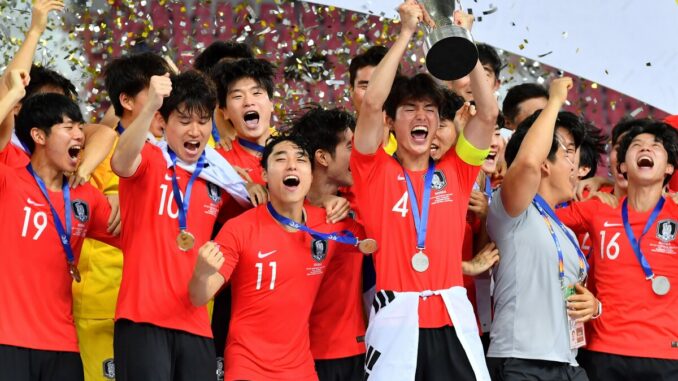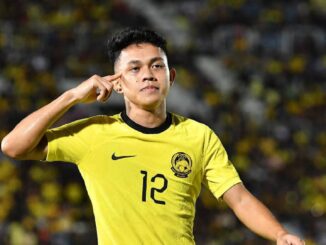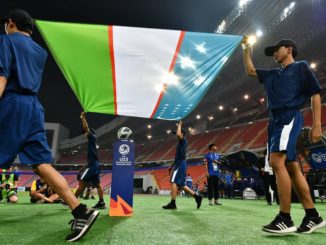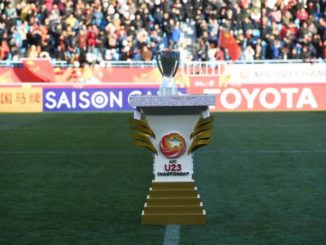
The biennial AFC U23 Championship, newly rebranded as the U23 AFC Asian Cup, is set to kick off a month-long international football feast in Asia, with the youth tournament playing second fiddle behind the culmination of World Cup qualification, the final round of senior Asian Cup qualification and a smattering of high-profile friendlies for those preparing for Qatar 2022, now less than six months away.
The timing of the U23 Asian Cup, like many of the other events taking place this June was, of course, greatly impacted by COVID. The first of a now long list of competitions dropped by original hosts China due to the pandemic back in late 2020, hosting was instead moved to Uzbekistan, and deferred six months to the summer to allow for extra planning time.
Uzbekistan’s selections was the consolation prize for a promising, yet always unlikely, pursuit of Asian Cup 2027 hosting. It marks a crucial stage in the country’s football however; organising what in effect replicates a mini-Asian Cup, a testing ground for future hopes of hosting larger, more significant senior events.
While fans are permitted to attend, it’ll broadly be a local affair, with the size of the tournament meaning that all but one group can be centralised in the capital Tashkent, the other (Group B) being played in Qarshi. With a neat overlap with the seniors hosting their final round of Asian Cup qualification in Namangan; it’s a good time to be a local Uzbek football fan.
It does, however, address what others in the U23 Asian Cup have to contend with, given the competing demands of both senior and youth football during the next month.
For Uzbekistan, maybe predictably as hosts and significant favourites to progress to an eighth straight Asian Cup, they have indeed shown their hand to prioritise the youth tournament, having called up a host of reputable senior players.
Youth football is an area in which the country has focused much of its energy over the last decade; winning the U23s in 2018, before falling at the semi-finals and cruelly the Olympic qualifying third-place play off in 2020.
While there will likely be a tug of war between youth and senior squads come the knockout stages (if successful), Uzbekistan boast one of the tournament’s strongest squads on paper, being able to call upon Russian-based wing back Ibrokhimkhalil Yuldoshev, Pakhtakor’s attacking outlet Khojimat Erkinov, Nasaf goal machine Khusayin Norchaev, alongside the intended poster boy for this tournament Jasurbek Jaloliddinov.
Jaloliddinov’s career, ever since his much-hyped breakthrough as a 16-year-old at Bunyodkor, has subsequently stuttered in brief and frustrating spells in Russia with Lokomotiv Moscow, and back home with Andijon and Lokomotiv Tashkent last term.
His return to Europe, this time in Kazakhstan with Kairat, is another attempt to rekindle the promising career many predicted for him.
While he may have fallen from the lofty reaches expected of him four years ago, especially as one of those intended to spearhead his team at this home tournament, at 20 years of age, he has the talent, time and notable opportunity to rekindle that desired impact.
Jaloliddinov makes up a squad sprinkled with top youth talent alongside a cohesive and well drilled base of players that make up half of the squad heralding from one club.
Two years ago, in preparation for the U23s and building towards their hopes of qualifying for the Olympics in 2024, the aptly named “Olympic FC” joined the Uzbek domestic pyramid.
Having succeeded in promotion from the Uzbek second tier last season, they have started admirably in the Super League this term, under the stewardship of U23 boss and former national team great Timur Kapadze.
Kapadze, once Uzbek captain, turned federation man, has impressed in his fledgling coaching career, providing another layer of interest for the future, with the former Pakhtakor and Incheon United midfielder tipped to succeed as senior national team coach once this current Olympic generation has passed through.
While fully stocked with talent and having ingrained their preparations perfectly for this coming summer, Uzbekistan will be one of many looking to upset the established order.
The four predictable favourites, neatly aligned as the same four sides that competed in the semi-finals at the U19 Championships in 2019, and with effectively the same cohort of players – head into this tournament in strong shape.
The champions of that tournament in Indonesia two years ago, Saudi Arabia, are riding a wave of optimism across the board; finalists at the last U23 Asian Cup in Thailand two years ago, qualifying for their first Olympic games since 1996 alongside back-to-back senior World Cup qualifications.
Youth coach Saad Al-Shehri’s relationship with senior coach Herve Renard has been one of the most widely heralded of ingredients behind the recent success at every level of Saudi football.
With that in mind, Al-Shehri is able to call upon a number of seniors within his U23 ranks for at least part of the tournament in Uzbekistan.
The defensive solidity of Al-Shabab’s Hassan Tambakti, one of the players of the tournament in 2020, is a real coup, as is the creative nuisance of teammate Turki Al-Ammar and Al-Ahli winger Ayman Yahya, feeding the attacking talents of Firas Al-Buraikan; still arguably Renard’s first choice number nine for this year’s upcoming World Cup.
The only other side that can replicate such a rich variety of attacking talents is South Korea’ who boast the golden triangle of Lee Kang-in, Cho Young-wook and Oh Se-hun; three players keen on staking their own claim for a World Cup call up later this year.
Korea are the only side to have made it to the final four in each previous U23 competition, and enter as reigning champions, having beaten Saudi Arabia 1-0 in Bangkok two years ago.
Their already bulging squad is paired back a tad, however, with the likes of Song Min-kyu and Um Won-sang missing out due to senior call ups for friendlies against Brazil, Chile, Paraguay and Egypt.
It remains to be seen whether fleeting minutes on the fringes of the senior camp demonstrate more to Paulo Bento of their suitability for the World Cup, than the experience of being part of a charge for continental glory ever could.
It’s a prioritisation approach shared by Qatar, the World Cup hosts, who set out on their first intense senior pre-tournament camp this June.
Senior coach Felix Sanchez has opted to retain his full squad, meaning the likes of Mohammed Waad and Homam Ahmed, key players of the youth set up of the last couple of years have been withdrawn from the U23 side.
Instead, Chilean coach Nicolas Cordova, who guided Al-Rayyan to the knockouts of the AFC Champions League two months ago during his interim spell in charge, has been left with a number of options who are out to re-establish themselves and prove a point to their detractors.
None more so than Abdulrasheed Umaru, the blistering attacking talent who shot onto the continental stage in their U19 campaign three years ago, but who subsequently has gone significantly off the boil ever since; joined by Al-Sadd duo Yusuf Abdurisag and Hashim Ali, who have similarly flattered to deceive of late.
While in general Qatari youth football has succeeded over the last five years, a meek exit at the last U23s, and a remarkably slow moving production line ahead of the World Cup hasn’t gone by unnoticed.
Qatar enter then in muted fashion, but they do have the raw ingredients if Cordova can inspire some cohesion.
They rarely disappoint in the goalscoring stakes at this level either; the golden boot has gone to a Qatari twice over the last three editions, so Umaru and co will be given extra incentive to replicate the likes of national team strikers Almoez Ali and Ahmed Alaa in Uzbekistan, and give Felix Sanchez a few extra options in a depleted area of the pitch for the Maroon.
Japan are another team tipped to progress to the latter stages, despite similar struggles including back-to-back tournament failings at the U23s, including a similarly drab winless elimination in Thailand last time out.
They are once again stocked with quality talent playing at home and abroad, and while the likes of Takefusa Kubo and Hiroki Ito have instead been called up by the seniors, they retain a strong enough squad that can compete for honours.
Central midfield inspiration Kyuru Matsuki, who has shone brightly with Tokyo in J1 this season headlines the inclusions, alongside Belgian based Koki Saito, who stood out at the last U19s, and domestic attacking duo Mao Hosoya and Yuito Suzuki who have been in impressive goalscoring form with Kashiwa and Shimizu respectively.
Similar qualities may be proven in time with Taika Nakashima. The tall and impactful Consadole Sapporo striker, who has impressed in brief moments domestically so far this season, could well turn out to be an interesting back up and breakthrough option at these U23s.
While the big four enter as pre-tournament favourites, there are credible threats from outside, namely Australia, who finished in third at the 2020 tournament to qualify for the Tokyo Olympics.
In many ways, the Olyroos success in 2020 was as a surprise; yet utilising the same set up, and being able to call on the striking talents of Bundesliga-based Alou Kuol and recent A-League breakout star Kusini Yengi, they arguably have better goalscoring options than two years ago.
The blossoming story of Rio-born Bernardo, the son of former Adelaide United player Cassio is an interesting side story to consider also, with the 18-year-old having developed an already eye-catching reputation at his father’s former club, the type of form he’s aiming to replicate in Australian gold.
A threat from elsewhere in Southeast Asia is also possible, given the recent match practice delivered at the Southeast Asian Games held in Vietnam last month.
All three youth teams from the region are interestingly drawn alongside one another (joined by favourites South Korea) in Group C, generating yet another Southeast Asian contest on the continental stage, replicating last year’s Asian Cup qualification campaign.
The games’ hosts and eventual champions, Vietnam, will be without their inspirational father-like coach Park Hang-seo for the first time since his appointment as they travel to Uzbekistan, instead being led by his compatriot Gong Oh-kyun.
The squad is a mirror image of the side that clinched silverware last month; headlined by the performances of goalkeeper Nguyen Van Toan, defensive stalwart Bui Hoang Viet and wide man Le Van Do.
The removal of the overage players permitted at the SEA Games, also opens up the opportunity to the likes of Nham Manh Dung, the scorer of the winner in the gold medal match against Thailand, to make a real case for a starting striker role in Uzbekistan.
Their final opponents in Hanoi, Thailand, supplement their SEA Games squad with senior call ups including Kritsada Kaman and Suphanat Mueanta. Crucial additions in the form of midfielder Ekanit Panya and striker Patrik Gustavsson establish a strong looking Thai side that is growing with expertise given the greater numbers in the squad plying their trade right across Europe.
The final SEA representative, Malaysia, return for their second appearance at this level, having made the quarter-finals back in 2018.
The likes of Luqman Hakim and Hadi Fayyadh were impactful in Vietnam last month and will again be out to prove a thorn in their more established competitors’ sides despite some question marks concerning their defence.
Elsewhere, Central Asian duo Tajikistan and Turkmenistan make their debut at this level, while their senior sides attempt to replicate their feat of qualifying for the finals tournament over the same time period.
Dual commitments reduce the strength of both squads being taken to neighbouring Uzbekistan, yet Tajikistan can still call upon the likes of midfield general Karomatullo Saidov and in form striker Rustam Soirov to base their hopes on.
Turkmenistan have called up seven of the Ahal squad that made history in the Champions League earlier this year; in particular goalkeeper Rasul Caryyev and striker Meylis Diniyev are players to look out for.
Iraq, despite lacking Manchester United starlet Zidane Iqbal, always prove a threat in youth football, especially with the expertise of former Bahrain coach Miroslav Soukup at the helm, while Jordan boast the talents of creative winger Omar Hani and talented, if not erratic, Abdallah Al-Fakhouri in goal.
While being unable to call upon Hull City supremo Allahyar Sayyadmanesh, Iran do have some eye-catching options in the form of Yasin Salmani of Sepahan and highly thought of centre back Saman Fallah, coached by international legend Mehdi Mahdavikia in his first managerial job since returning from Germany.
Although events in Uzbekistan will be of secondary importance for much, if not all, national team fans this June; the U23 Asian Cup will continue to deliver one of the most entertaining and insightful windows into the next generation of Asian footballing talent.
While this edition fails to catapult players into direct Olympic consideration, with a senior World Cup and Asian Cup on the horizon, watch out for a breakthrough performance or two that could have a real impact on national prospects in the coming years.
Photo: the-afc.com
Listen to Episode 84 of The Asian Game podcast




